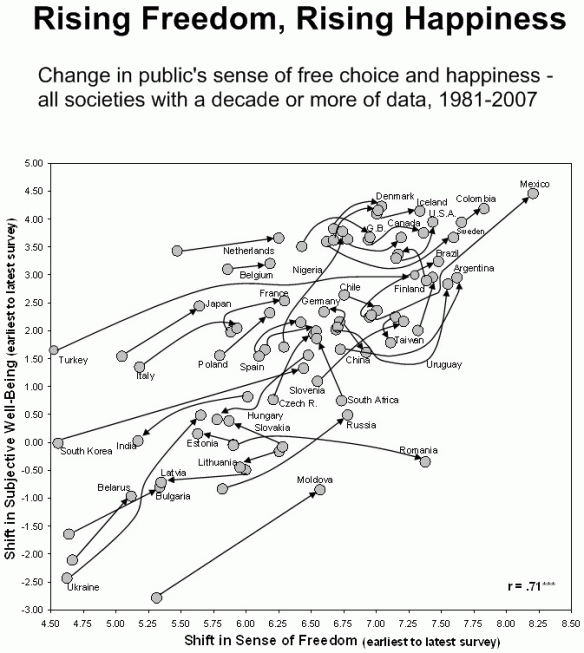The Financial Times brings us word of a new study by a handful of researchers in the US and Germany, published here in pdf. Some excerpts:
ABSTRACT—Until recently, it was widely held that happiness fluctuates around set points, so that neither individuals nor societies can lastingly increase their happiness. Even though recent research showed that some individuals move enduringly above or below their set points, this does not refute the idea that the happiness levels of entire societies remain fixed. Our article, however, challenges this idea: Data from representative national surveys carried out from 1981 to 2007 show that happiness rose in 45 of the 52 countries for which substantial time-series data were available. Regression analyses suggest that that the extent to which a society allows free choice has a major impact on happiness. Since 1981, economic development, democratization, and increasing acceptance of diversity have increased the extent to which people perceive that they have free choice, which in turn has led to higher levels of happiness around the world, as the human development model suggests.
Ok, makes sense so far.
But the strongest support for the claim (my note: which the authors challenge) that the happiness levels of countries have not risen over time comes from the United States, which provides by far the longest and most detailed time-series data on SWB. Hundreds of surveys have measured happiness and life satisfaction among the American public in almost every year since 1946. No other country has a comparable database, and the US data show a flat trend from 1946 to the present.
This finding was very surprising to me, since I would have thought that the degradation of community and family and the steady creep of totalitarianism and tabloid society would have had a negative effect on happiness in the US. I would have expected happiness to decrease over the last 60 years even as material wealth has increased, since earlier studies have shown a decoupling of happiness with wealth after a basic comfort level is reached (at about $10,000 per capita). As the authors explain their thesis:
This societal-level shift is linked with individual-level value changes, from giving top priority to economic and physical security toward giving top priority to self-expression values that emphasize participation, freedom of expression, and quality of life… The underlying theme of this shift in life strategies is to deemphasize external authority and maximize individual autonomy.
That’s certainly where this individual’s priorities lie, and why he has chosen a life outside of the US. My own conclusion from reading this study is that its methodology for measuring happiness must be flawed, since it relies heavily on asking people versions of the question, “how happy are you?” It seems to me that various societies may have typical responses to the question that do not reflect their actual well-being. Maybe it just is never acceptable for a Japanese to wax on about how great his life is, while it is perfectly normal for a Mexican to do so.
Maybe people don’t really know how happy they are as a society if they don’t have perspective across time and geography, something that very few possess (as evidenced by such phenomena as the success of propaganda or occurrence of financial bubbles). I also suspect that this little study of studies was commissioned and promoted as part of the west’s campaign to spread “freedom and democracy” at the point of a gun.
It’s release is particularly timely in light of the new tensions in Eastern Europe, since it shows that the strongest shift towards happiness in the last 30 years occurred in that region (hint: evil Russia wants to repress its poor neighbors again, and the USA must help them preserve their newfound happiness). Also notable is that China’s happiness has decreased according to the survey, since of course we are to believe that despite outward material success, those smiles at the Olympics are just for show, ordered up by the Party leaders.
At any rate, here is the chart the authors provide, from the World Values Survey. Draw your own conclusions.
Click on image for sharper view.

